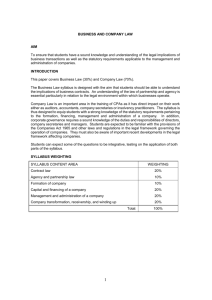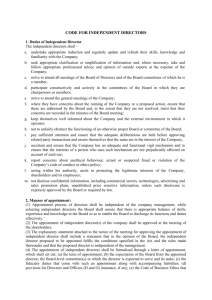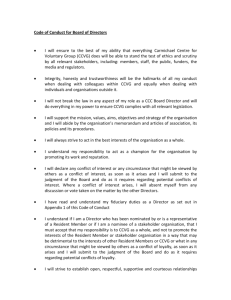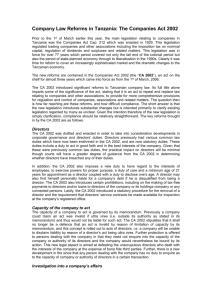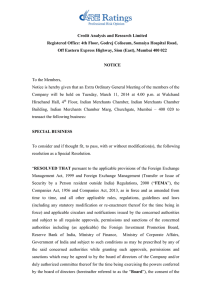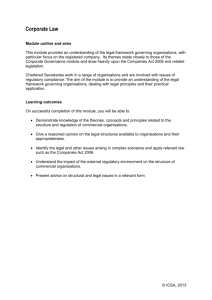Presentation On Power And Duties Of Directors Presented By
advertisement
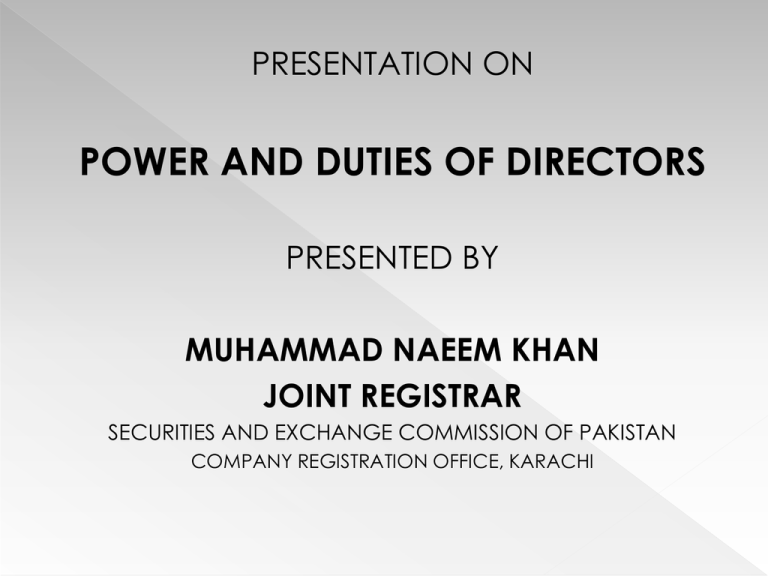
PRESENTATION ON POWER AND DUTIES OF DIRECTORS PRESENTED BY MUHAMMAD NAEEM KHAN JOINT REGISTRAR SECURITIES AND EXCHANGE COMMISSION OF PAKISTAN COMPANY REGISTRATION OFFICE, KARACHI The Law recognizes a company, as a “legal person” which in its own rights, is capable of owning property, making contracts, conducting litigations and also responsible for doing wrongs. When we look at these matters from practical angle and at the way in which this artificial legal person functions; its corporate will is manifested, its decisions taken and its acts performed, we see that a company cannot do any thing at all except through the human beings. The business of the Company is managed by the Directors who may pay all expenses incurred in promoting and registering the Company and may exercise all such powers of the company as are not by the Ordinance, or by the articles, or by a special resolution, required to be exercise by the company in general meeting. Directors act as fiduciaries to the company. Fiduciary duties of directors fall under two general categories; (i) duty of care; and (ii) duty of loyalty. DUTY OF CARE Under the duty of care, a director’s responsibility is to perform his/her duties with the diligence of a reasonable person in similar circumstances. DUTY OF LOYALTY Under the duty of loyalty, a director’s fiduciary duty is to act in good faith for the best interests of the company. Directors’ duties arise from the following: Law/ Rules. The Memorandum and Articles of Association of the company. Service agreements specifically entered between the director and the company. Resolutions passed at members’ or directors’ meetings. Allotment of shares (S. 73) Issuance of shares certificates to the shareholders (S.74 to 75) Transfer of shares (S. 76 to 81) Registration of Charges (S. 121 to 136) Maintenance of Registered Office Address (S. 143) Holding of general meetings (S. 157 to 159) Maintenance of Minute’s Book (S. 173) Election of Directors (S. 178 to 180) Appointment of Chief Executive (S. 198 to 203) Appointment of Company Secretary (where applicable) (S. 204A) Maintenance of books of accounts (S.230) Preparation, audit and presentation of accounts in the AGM (S. 233) Preparation of quarterly accounts by a listed company (S. 245) Appointment of first Auditor (S. 252 to 254) Appointment of Legal Adviser (Companies Appointment of Legal Advisor’s Act, 1974) The directors of a company may exercise the following powers on behalf of the company, and shall do so by means of a resolution passed at their meeting, namely: › to make calls on shareholders in respect of moneys unpaid on their shares; › to issue shares; › to issue debentures or 1[any instrument in the nature of redeemable capital]; › to borrow moneys otherwise than on debentures; › to invest the funds of the company; › to make loans; › to authorize a director to enter into any contract between the company and associated undertaking for making sale, purchase or supply of goods or rendering services with the company; › to approve annual or half-yearly or other periodical accounts as are required to be circulated to the members; › to approve bonus to employees; › to incur capital expenditure on any single item or dispose of a fixed asset in accordance with the limits as prescribed by the Commission from time to time; › to undertake obligations under exceeding one million rupees; leasing contracts › to declare interim dividend; and › having regard to such amount as may be determined to be material (as construed in Generally Accounting Principles) by the Board,- Accepted (i) to write off bad debts, advances and receivables; (ii) to write off inventories and other assets of the company; and (iii) to determine the terms of and the circumstances in which a law suit may be compromised and a claim or right in favor of a company may be released, extinguished or relinquished.] The company through its Article of association may authorize/ restrict the duties of directors subject to the condition that these restrictions/ authorization are not contrary to the Law e.g. law requires a board resolution for capital expenditure and disposal of fixed assets at Rs 1 million and Rs 1 lac respectively. However, the company through its articles can further restrict this limit. Director shall cause to maintain following registers/ books as provided under the Law. Register of transfer of shares (section 76); Register of buy-backed shares by a company (section 95A); Register of mortgages, charges etc. (section 135); Register of members and index thereof (section 147); Register of debenture-holders (section 149); Maintenance of Minute’s Book (S. 173) Register of directors and other officers (section 205); Register of contracts, arrangements and appointments in which directors etc are interested (Section 219); Register of directors' shareholdings and debentures (section 220); Register of deposits(Rule 15/1 of deposit rules); THANKS



